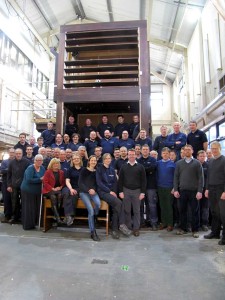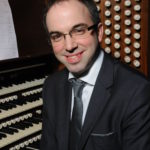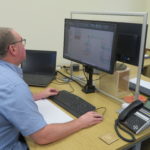Board of Directors
Management
Tuners
Stephen Alliss – Head Tuner
Stephen joined the company in August 2010. He is the tuner for the Midlands and
Eastern counties.
Ian Lackenby
Ian joined the company in September 1987. He is the tuner for Durham, Yorkshire and the North West.
Laura Johnson
Laura is the daughter of Mark and Katherine Venning and joined the company in September 2006. She is one of the tuners for London and the
South East.
Jake Holmes
Jake joined the company in February 2011. He is in charge of the tuners for London and the South East.
Rafael Gamiz
Rafa joined the company in August 2015. He is one of the tuners for Northumberland
and Scotland.
Derek Funnell
Derek has been working for the company since 2011 and took on responsibility for the tuning round in the South West in 2021.
Organ Builders & Staff
 The labour-intensive techniques of organ building require an unusual quality of craftsman. We currently employ over 40 organ builders, including specialists in voicing, pipe making and tuning. We attach great importance to our training programme; the firm is one of the few left in the country operating a traditional apprenticeship scheme and at present we have three apprentices.
Typically, an H&H organ builder will have joined the firm as an apprentice at the age of sixteen on a four-year apprenticeship, though training continues for much longer than that. Our workshop has a family atmosphere and the presence of siblings & cousins reinforces this. Many of the organ builders come from the Durham area; most stay with H&H throughout their working lives. An awareness of international trends and techniques has been augmented in recent years by interaction with craftsmen from other European countries.The ingenuity and tenacity of our workforce have been an inseparable part of the firm’s success.
The labour-intensive techniques of organ building require an unusual quality of craftsman. We currently employ over 40 organ builders, including specialists in voicing, pipe making and tuning. We attach great importance to our training programme; the firm is one of the few left in the country operating a traditional apprenticeship scheme and at present we have three apprentices.
Typically, an H&H organ builder will have joined the firm as an apprentice at the age of sixteen on a four-year apprenticeship, though training continues for much longer than that. Our workshop has a family atmosphere and the presence of siblings & cousins reinforces this. Many of the organ builders come from the Durham area; most stay with H&H throughout their working lives. An awareness of international trends and techniques has been augmented in recent years by interaction with craftsmen from other European countries.The ingenuity and tenacity of our workforce have been an inseparable part of the firm’s success.Training & Apprenticeships
 H&H is committed to training. We take trainees at any age; some come straight from school or university and others have advanced woodworking skills. Initial training may take up to four years, and skills continue to develop thereafter. One of the first jobs is to perfect the skill of leathering ‘motors’, which are miniature bellows for the organ mechanism. Woodworking skills are developed to a high standard, as accuracy is vital. All aspects of organ building must be mastered, and trainees go on to develop specialist skills which may include console work, leathering of reservoirs, pipemaking, tuning and voicing.
H&H is committed to training. We take trainees at any age; some come straight from school or university and others have advanced woodworking skills. Initial training may take up to four years, and skills continue to develop thereafter. One of the first jobs is to perfect the skill of leathering ‘motors’, which are miniature bellows for the organ mechanism. Woodworking skills are developed to a high standard, as accuracy is vital. All aspects of organ building must be mastered, and trainees go on to develop specialist skills which may include console work, leathering of reservoirs, pipemaking, tuning and voicing.
Organ builders work as part of a team in the workshop, and also in churches and concert halls, both nationally and internationally. When choosing apprentices, we look for people who will thrive in a skilled and friendly environment; the work requires an eye for quality, attention to detail, versatility for a wide variety of tasks, and willingness to work away from home.

















